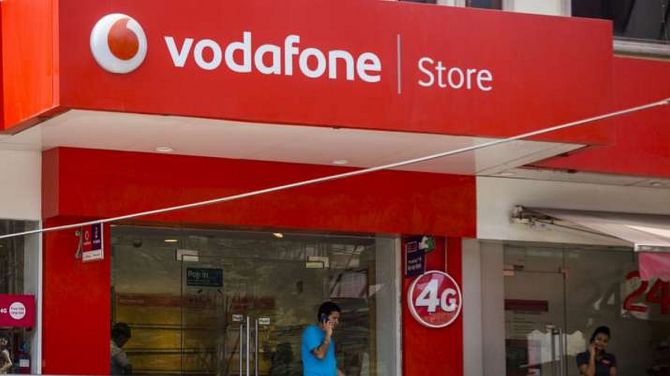 | « Back to article | Print this article |
India has challenged in a Singapore court a verdict of an international arbitration tribunal that overturned its demand for Rs 22,100 crore in back taxes from Vodafone Group Plc, sources said on Thursday.

An international arbitration court had on September 25 rejected tax authorities' demand for Rs 22,100 crore in back taxes and penalties relating to the British telecom giant's 2007 acquisition of an Indian operator.
Two sources privy to the development said India had 90 days to file an appeal against the tribunal award, and the same was done in a Singapore court earlier this week.
This appeal also sets the stage for the government to challenge the order of a three-member tribunal at the Permanent Court of Arbitration in The Hague that asked India to return $1.4 billion to British oil and gas company Cairn Energy plc.
The government had used a 2012 law that gave tax authorities the power to reopen past cases, to seek taxes from Vodafone and Cairn over alleged capital gains made several years ago.
Both Vodafone and Cairn had challenged the tax demands under bilateral investment protection treaties and initiated the arbitration.
Sources said the government believes that taxation is not covered under investment protection treaties with various countries and the law on taxation is a sovereign right of the country.
While the treaties are primarily aimed at protection of investments, the tax is levied on 'returns' earned by entities.
Vodafone Group declined to comment on the issue.
Vodafone had challenged before the arbitration tribunal the demand for Rs 7,990 crore in capital gains taxes (Rs 22,100 crore after including interest and penalty) under the Netherlands-India Bilateral Investment Treaty (BIT).
The demand pertained to Vodafone's $11-billion acquisition of 67 per cent stake in the mobile phone business owned by Hutchison Whampoa in 2007.
In September, an international arbitration court ruled that the Indian government seeking Rs 22,100 crore in taxes from Vodafone using retrospective legislation was in "breach of the guarantee of fair and equitable treatment" guaranteed under the bilateral investment protection pact between India and the Netherlands.
India had 90 days or till December 24 to challenge the Vodafone award before a court in Singapore - which was the seat of the arbitration.
As per the award, the government has to reimburse Vodafone 60 per cent of its legal costs and half of the 6,000-euros cost borne by Vodafone for appointing an arbitrator on the panel.
Sources said the Government of India's liability came to Rs 85 crore in legal cost.
In the separate case of Cairn, India has been asked to pay with interest the value of shares it sold, the dividend it seized, and tax refunds it withheld to recover part of tax demand from the British firm.
The government, the sources said, is expected to challenge this ruling too given the size of the award.
Cairn Energy, which gave the country its biggest oil discovery, was in March 2015 slapped with a demand for Rs 10,247 crore tax on alleged capital gains it made when it in 2006 reorganised its India business before listing of the local unit.
Vodafone International Holding (a Netherland company) had in February 2007 bought 100 per cent shares of Cayman Island-based company CGP Investments for $11.1 billion to indirectly get 67 per cent control of Hutchison Essar Ltd - an Indian company.
The tax department felt the deal was designed to avoid capital gain tax in India and imposed a tax demand, which was rejected by the Supreme Court in 2012.
To stop abuse and plug the loophole of such indirect transfer of Indian assets, the government in 2012 amended the law to make such transfers taxable in India, they said, adding Vodafone was slapped with a fresh demand which the firm contested through international arbitration.
Photograph: PTI Photo